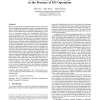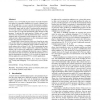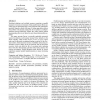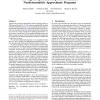135
click to vote
PLDI
2012
ACM
13 years 4 months ago
2012
ACM
Modularity is a central theme in any scalable program analysis. The core idea in a modular analysis is to build summaries at procedure boundaries, and use the summary of a procedu...
136
click to vote
PLDI
2012
ACM
13 years 4 months ago
2012
ACM
Software-based thread-level parallelization has been widely studied for exploiting data parallelism in purely computational loops to improve program performance on multiprocessors...
146
click to vote
PLDI
2012
ACM
13 years 4 months ago
2012
ACM
While graphics processing units (GPUs) provide low-cost and efficient platforms for accelerating high performance computations, the tedious process of performance tuning required...
100
click to vote
PLDI
2012
ACM
13 years 4 months ago
2012
ACM
Efficient communication and synchronization is crucial for finegrained parallelism. Libraries providing such features, while indispensable, are difficult to write, and often ca...
107
click to vote
PLDI
2012
ACM
13 years 4 months ago
2012
ACM
Chimera1 uses a new hybrid program analysis to provide deterministic replay for commodity multiprocessor systems. Chimera leverages the insight that it is easy to provide determin...
141
click to vote
PLDI
2012
ACM
13 years 4 months ago
2012
ACM
Existing dynamic race detectors suffer from at least one of the following three limitations: (i) space overhead per memory location grows linearly with the number of parallel thre...
163
click to vote
PLDI
2012
ACM
13 years 4 months ago
2012
ACM
Generic programming (GP) is an increasingly important trend in programming languages. Well-known GP mechanisms, such as type classes and the C++0x concepts proposal, usually combi...
104
click to vote
PLDI
2012
ACM
13 years 4 months ago
2012
ACM
We propose a new language-based approach to mitigating timing channels. In this language, well-typed programs provably leak only a bounded amount of information over time through ...
129
click to vote
PLDI
2012
ACM
13 years 4 months ago
2012
ACM
Workload, platform, and available resources constitute a parallel program’s execution environment. Most parallelization efforts statically target an anticipated range of environ...
119
click to vote
PLDI
2012
ACM
13 years 4 months ago
2012
ACM
Approximate program transformations such as skipping tasks [29, 30], loop perforation [21, 22, 35], reduction sampling [38], multiple selectable implementations [3, 4, 16, 38], dy...




